MEDJOOL DATES |
||
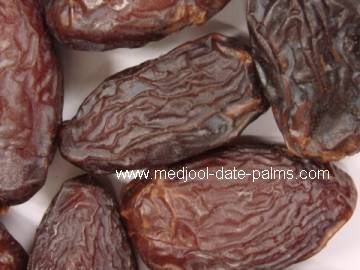 | ||
| Fresh Picked Medjool Dates | ||
Medjool Dates
One of the most famous date varieties is the Medjool Date, which is considered by many to be the "king of dates". The medjool date was once reserved only for the royal family of the Sultan of Morocco! This amazing date palm variety was first imported into the USA from the Bou Denib Oasis in Morocco in 1927.
The medjool date is most well known for its unusually large size and its delicious flavor. The medjool date is classified as a soft date, although it is a little firmer and handles better than most other soft dates.
Medjool dates are available at many retail grocery stores throughout the USA. These store-bought medjool dates can be very tasty, however the dates sold in most grocery stores are from a previous year's harvest that have been kept in refrigerated storage for up to a year or more...
Imagine how much more delicious a fresh picked medjool date is, and we offer fresh picked organic medjool dates!
Fresh Picked Medjool Dates For Sale
We grow all of our medjool dates organically with no pesticides, and they are packed with no chemicals and no preservatives; they are pure naturally sweet delicious medjool dates! Did you know that medjool dates are 100% fat free?
Our fresh picked organic medjool dates are available for purchase each year in October and November.
Each year, we have a very limited quantity of fresh picked organically grown medjool dates available. We usually have two sizes available: the large medjool dates, and the extra large or "jumbo" medjool dates. Each year we do sell out before the crop is picked, so be sure to place your order early!
We begin taking orders by phone each year on August 25 for our medjool date crop at 909 941 1060.
Honey Jewel DatesTM
A very sweet and delicious "new" California date variety is the date cultivar named the Honey Jewel DateTM.
The Honey Jewel DateTM is amazingly delicious, soft and super sweet like honey in its fully ripe tamar stage of ripening. This unique and delicious date variety ripens very early in the season, almost a full month before the famous medjool dates are ripe.
Dates are classified as soft, semi-dry, and dry. The Honey Jewel DateTM is very soft at the fully ripe tamar stage.
We have fresh Honey Jewel DatesTM available each year in late September at their tamar stage of ripening when they are fully ripe and soft.
We begin taking orders by phone each year on August 25 for our Honey JewelTM date crop at 909 941 1060.
Halawi Dates
Halawi dates (also known as Halawy) are a very sweet soft date variety of medium size with wonderful caramel-honey like flavor. The halawi date palm variety originated in Mesopotamia and has been propagated by off-shoots for millenia. The name halawi actually means "sweet" in Arabic. In some cultures, the halawi date is eaten at the khalal stage when it has become yellow and is still crunchy like an apple. The flavor at this khalal stage is less sweet and very different. If allowed to ripen further, the halawi date will next enter the rutab stage where it begins to turn a beautiful golden-amber color as it softens and becomes very sweet and delicious.
Halawi date palms grow well in Southern California. When used for landscaping, the halawi date palm trunk and canopy are larger than both the medjool and the zahidi, making the halawi date palm a truly spectacular landscape date palm specimen!
We begin taking orders by phone each year on August 25 for our halawi date crop at 909 941 1060.
Barhi Dates and Barhi Date Palms
The Barhi date is very sweet and very soft. This relatively small but very popular date variety is also one of the few dates that are edible while still hard and cruchy at the khalal stage of ripening.
Barhi date palms are highly sought after and relatively few new off-shoots are available each year. As a result, Barhi date palm offshoots tend to be one of the most expensive date palm offshoots, and they often are not available at any price!
We begin taking orders for each year's barhi date crop on August 10.
Zahidi Dates
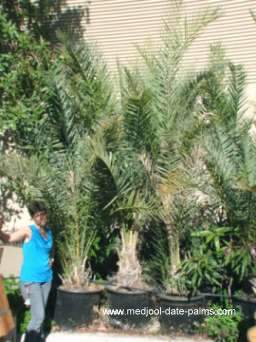
Zahidi dates (aka Zehedi, Zadie, and originally from the Persian Azadi) are a very sweet and delicious medium size date that is basically a dry date, although it can be used as a soft date or as a dry date depending on the length of time it is allowed to remain on the palm.
The zahidi date palm is an ancient cultivar from Mesopotamia dating back millenia, and the name meant Nobility in ancient Persian. Fully ripe zahidi dates have beautiful golden-yellow color and they are early season.
The Zahidi date palm rooted offshoots shown at left are 12 year old rooted off-shoots in 25 gallon pots.
We have female zahidi date palm offshoots available with special pricing. These rooted zahidi offshoots stand from 12-16 feet tall and have from 1-2 feet of woody trunk, and they are mature enough now to start producing dates! Please call (909) 941 1060 for pricing.
Zahidi date palms are very vigorous as well as prolific in fruiting, and they do grow well in Southern California. For landscaping, the zahidi date palm is among the finest of the date palms. The zahidi trunk and canopy is very similar to the medjool date palm with beautiful silvery green foliage, and the zahidi has a slightly more dense upright canopy than the medjool. Like the medjool, the zahidi date palm is highly prized for the quality and flavor of its dates, as well as for its majestic appearance.
We begin taking orders by phone each year on August 25 for our Zahidi date crop at 909 941 1060.
Medjool Date Nutritional Information
Medjool dates are highly nutritional, and they are truly one of nature's most power packed and healthy foods!Dates are fat-free, sodium-free and cholesteral free!
Dates also contain polyphenols, which are a plant antioxidant that can destroy disease causing free radicals.
Dates have 20 different kinds of amino acids, which aid in the digestive process. Medjool dates are very rich in both vitamins and minerals, and they contain more potassium than an orange or a banana per ounce. These nutritious fruit of the medjool date palm contain vitamins A, A1, B1, B2, B3, B5, and B6. Dates also are rich in oil, calcium, sulfur, iron, copper, phosphorous, manganese, protein and fiber.
Medjool dates also are high in carbohydrates making them an excellent source of quick energy and a perfect choice as an energy boosting snack. Dates metabolize carbohydrates and they maintain blood glucose levels. They also help make hemoglobin in blood cells. Medjool dates are also helpful to people suffering with anemia and fatigue. Dates act as natural laxatives and can be an easy remedy for constipation.
Most date varieties (including the medjool date) have a sugar content that is almost entirely of the inverted sugar forms glucose and fructose (except for deglet noor dates and thoory dates which have higher percentages of sugar in the form of sucrose). This is very important important for people who cannot tolerate sucrose. The invert sugar in medjool dates is immediately absorbed by the human body without the need for digestion that ordinary sugars like sucrose undergo.
People of the Middle East have consumed the fruit of the date palm for thousands of years as part of their diet. Traditionally, the fruit of the date palm has been used for treating many kinds of ailments in the Islamic world including the treatment of respiratory disorders, and to stimulate the heart rate. Dates also have traditionally been processed into a salve for treating certain kinds of wounds. The fruit of the true date palm also is recommended for consumption by lactating women to add extra nutrition into their diet. The Plant Sciences Division website at the University of California at Davis, states that Bedouin Arabs who eat dates on a regular basis have shown an extremely low incidence of cancer and heart disease when compared with people who do not eat dates regularly.
Dates also are an excellent choice for emergency food rations because of the date's high caloric content & nutritional value combined with the fact that dates keep well without refrigeration for long periods of time.
Male Date Palm Flowers, Date Palm Pollen, and Medjool Date Palm Pollination
Date palms are dioecious, which means that there are both male date palms and female date palms. The male date palm flowers produce the pollen, and the female date palm produces flowers which will become dates, if they are pollinated. Medjool date palms are females.
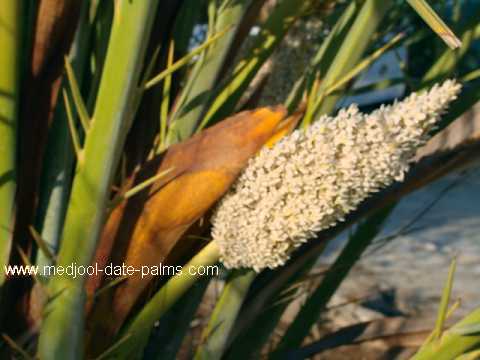
Bees have a strong attraction to date palm pollen. Date palms do pollinate naturally by wind, bees and other insects, but proximity of the male date palms to the females is very important, and date production from open polination is often much less. Artificial pollination increases date production substantially in most cases. Artificial pollination of date palms is performed using the date palm pollen from male date palm flowers to polinate the female date palm flowers.The photo at left shows a male date palm flower three days after opening.
The flower stalks of both male and female date palms are produced inside a spathe. The spathe emerges from the axils of the leaves in early spring in mature date palms. The date palm flowers form within the long stout spathe which, on bursting, exposes many thickly crowded floral branchlets inside which are thicker and shorter in the male date palm inflorescence, and the branchlets are long and slender in female date palm inflorescence. Adult female date palms produce from 5 - 20 spathes in early spring. The male flowers are borne single and are waxy white, while the female flowers are borne in clusters of three and are yellowish green in colour. A male spathe that is ready to split open changes color from green to brown and it becomes slightly softer. Immediately after the spathe opens and the male inflorescence appears, these male flowers reach their maturity. Date growers usually harvest the male flowers within one 24 hours of when the spathe splits open.
We have fresh male date palm flowers available in March and April each year for use in pollination, and also as a source of fresh date palm pollen.
To purchase fresh date palm male flowers (and date palm pollen), call (909) 941 1060.
There are several methods of date palm polination in use today. The oldest and simplest pollination technique consists of placing an entire male flower spathe in the crown of the female date palm and leaving the pollination to wind, bees and other insects. This technique does not always yield uniform fruit sets unless if several of the male flower spathes are placed in the crown of the female date palm. This requires the availability of numerous male flower spathes.
Successful commercial medjool date production requires artificial pollination to ensure good pollination. In locations where labor is relatively expensive, the pollination is mechanized. Mechanized pollination reduces the number of male date palms needed for pollination. The male/female ratio in a modern commercial date palm plantation with mechanized pollination is generally about 40 female medjool date palms to one male date palm. The most common technique of pollination in regions with inexpensive labor is to cut the strands of male flowers from a freshly opened male spathe and place two to three of these strands, lengthwise and in an inverted position, between the strands of the female inflorescence after some pollen has been shaken over the female inflorescence.
How To Buy Medjool Date Palms in California
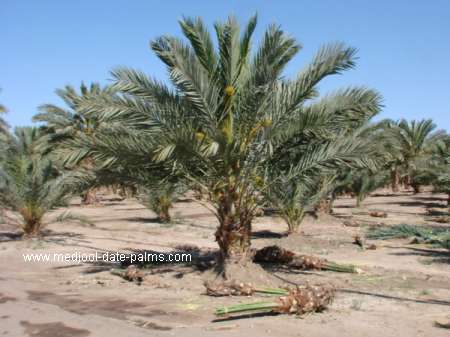
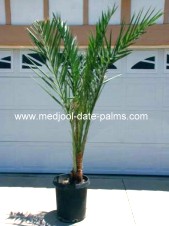
We specialize in already rooted medjool date palm offshoots in containers. Please call 909 941 1060 for current date palm price & availablilty.
Our male date palm rooted offshoots are available in 15 gallon and 25 gallon pots, as well as larger male date palms still in the ground. We also offer female date palm cultivars including medjool date palms offshoots, zahidi date palm offshoots, halawi date palm offshoots, and barhi date palm offshoots.
Our Medjool date palm offshoots are available in all sizes from recently removed pups or "offshoots" to full grown mature palms. The photo above on the right shows a rooted medjool offshoot in a 15 gallon container.
We have female Zahidi date palm offshoots & Medjool date palm offshoots in stock right now, as well as Barhi date palm offshoots and Halawi date palm offshoots.
Male date palms are a popular choice for use in landscaping, and also as a source of date palm pollen for pollination of female date palms. Female date palms produce dates, and they are planted in large plantations for commercial date production. Male date palms for landscaping are less expensive than most female date palm cultivars, while some female date palms grown from off-shoots of specific date cultivars have very limited availability and high demand.
We have smaller size female medjool date palm rooted offshoots for sale in 15 gallon pots & 25 gallon pots for those who wish to grow their own dates at home in their yard, and we also have some female medjool date palm rooted offshoots for sale in larger 36 inch wooden boxes & in 65 gallon pots. Larger size mature female medjool date palms are available for transplant directly from the field as well, however transplanted palms usually go thru a period of die-back at the time of transplant while rooted offshoots in containers keep right on growing with no die-back when cared for properly.
Our smaller size male date palm offshoots are also for sale in 15 gallon pots and in 25 gallon pots (male date palms are used for polination & for landscaping).
Our female medjool date palm "rooted" offshoots are in containers. After these medjool palm pups are removed from their medjool mother palms, they have to develope their own roots which takes several months, and they then begin to put out new growth. Our 8 year old female medjool date palm rooted off-shoots stand about 7 to 8 feet tall. These rooted medjool off-shoots are ready for planting. Please call 909 941 1060 for price information and how to purchase in California.
Older mature date palm trees are sold based on their age and the amount of woody trunk the palm has: a recently removed pup usually has about 1 foot of woody trunk, a 12 foot tall date palm has about 3 feet of woody trunk, and a 20 foot tall date palm has about 10 feet of woody trunk.
Date palm rooted offshoots in containers experience no die-back when properly planted and cared for.
Larger date palms however, that are dug up in the field and shipped directly to the customer usually experience severe die-back lasting a year or more before vigorous growth returns, and a significant percentage frequently may not survive if not properly cared for. For this reason, we always recommend planting rooted date palm offshoots in containers rather than purchasing date palms directly from the field.
Please call 909 941 1060 for current price & availablilty of rooted medjool date palm off-shoots in containers.
Frequently Asked Questions
- SHIPPING: For medjool date palm offshoots in 15 & 25 gallon containers, we recommend that you transport the date palms in your pick-up truck. Local delivery to your driveway can usually be arranged (only in Southern California) with a delivery cost from $50 to $150 depending on the round-trip mileage (50 mile maximum round-trip travel distance). Transport for large medjool date palms can also be arranged in Southern California.
- Our medjool dalm palm rooted offshoots (and our other date palm cultivars) are grown near Indio, California. Smaller size medjool date palms are available for pick-up in Rancho Cucamonga, California, by appointment only. Delivery of medjool date palm trees to customers in Southern California can be arranged. We do recommend that you hire an experienced landscaper (we do not offer landscaping services!) for planting and irrigation of date palms.
- Sub Tropical Fruit Trees: Available for pick-up in Rancho Cucamonga, California, by appoinment only, at one of our two locations.
- PAYMENT: We accept Cash, Check, American Express, Visa, Mastercard & Discover. You can pay in advance or at the time of pick up.
- MEDJOOL DATES: fresh picked medjool dates are available each year in October, organically grown in California.
- GUARANTEE: We guarantee our plants, fruits and trees to be in good condition at the time of sale.
- For all other questions, you may contact us at: Tropical Oasis Farms, PO Box 1011, Rancho Cucamonga, California 91729
© Copyright 1999-2025